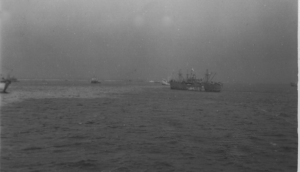C.E. Chavez was, by his own account, a typical child growing up in El Paso Texas. He left Mexico when he was very young, so, as he said, America was the only home he new. He was typical, but he wasn’t a citizen. That would change, but not until his life’s journey took him to another place and through another difficult chapter in his story.
At age eighteen Chavez got a letter. It came from the President and the Congress of The United States. The exact words he remembers are: “Your friends and neighbors need you.” This was his draft notice. Recalling reactions, Chavez recounts that some of his relatives were expecting the news and were surprised it hadn’t come earlier. Some knew his service would reduce the probability any of them would be repatriated to Mexico and the income from his military salary was a welcome addition to the family income. It was his duty, so he became Private C.E. Chavez, U.S. Army!
 Inducted at Fort Bliss, Chavez was sent next to Fort Knox, KY and then to Newport News, VA. From there he shipped out to the city of Street, Somerset County, England. On June 8, 1944, not yet assigned to a unit, he arrived at Normandy and then, in July, he was assigned as a replacement troop in the 23rd Cavalry Reconnaissance. Sometime after the breakout at St. Lo, in the vicinity of Nancy, France, Chavez was wounded (in the arm) while on reconnaissance. His team was attacked from across an open field, a common danger situation for reconnaissance operation. He returned to the rear to recover. He chuckled when he recalled that rear echelon troops offered to buy his shirt, the one that was hit by German fire. He sold it for forty-dollars, a hefty sum in those days!
Inducted at Fort Bliss, Chavez was sent next to Fort Knox, KY and then to Newport News, VA. From there he shipped out to the city of Street, Somerset County, England. On June 8, 1944, not yet assigned to a unit, he arrived at Normandy and then, in July, he was assigned as a replacement troop in the 23rd Cavalry Reconnaissance. Sometime after the breakout at St. Lo, in the vicinity of Nancy, France, Chavez was wounded (in the arm) while on reconnaissance. His team was attacked from across an open field, a common danger situation for reconnaissance operation. He returned to the rear to recover. He chuckled when he recalled that rear echelon troops offered to buy his shirt, the one that was hit by German fire. He sold it for forty-dollars, a hefty sum in those days!
Following recovery, our hero returned to his same unit, something uncommon in the fray of war. The 23rd Cavalry Reconnaissance Unit was part of the 4th Armored Division of General Patton’s 3rd Army. Although he never saw Patton (nicknamed “Old Blood & Guts”) Chavez was along for the ride when Patton promised General Eisenhower he could relieve the 101st Airborne Division, entrenched and surrounded at Bastogne. In fact, he joined his unit on December 23rd, just in time for the trip!
Along the way Private Chavez earned the rank of T-5, a technical rank, one that carried no hierarchical authority. Chavez was, and still is, the essence of the soldier who quietly does his duty, who fights on without complaint and without fanfare. When I asked what it was like to have liberated Bastogne and the 101st Airborne (dubbed “The Battered Bastards of Bastogne”) he told me his unit wasn’t selected to go into the town. He claimed no glory. He was just doing his job. He was a soldier.
As the war neared its end, the 23rd Cavalry Reconnaissance unit continued the push into the German Fatherland. Regular army (Wehrmacht) troops were giving up the fight, but Chavez noted the Hitler Youth, young men, teenagers, continued resistance. One day the 23rd was approaching a town where residents were flying white flags from their windows, a signal of surrender. Two Germans opened fire and in the ensuing battle, Chavez was again wounded, this time taking shrapnel (sharp pieces of metal typically from weapons like bombs, artillery rounds or hand grenades). Back he went to the rear, and eventually to Street, England. There he stayed until the end of the war. When I asked how he felt when he heard the war was over, he told me that even today, words can’t express the emotions.
Our story doesn’t end with Germany’s surrender. Just like the great Greek Hero, Odysseus, Pvt. Chavez still wasn’t home. The final leg of the journey will be the topic of the next blog…
For more information, visit the I-History Project-WW2 or contact me directly at jeff@ihistoryproject.org